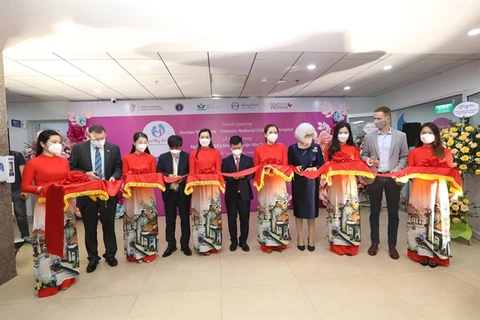Hanoi (VNA) - Misleading claims made by infant formula milk marketing, both globally and in Vietnam are undermining breastfeeding, a practice that brings lifelong health benefits to babies and young children, say the World Health Organization (WHO) and the United Nations Children’s Fund (UNICEF) during World Breastfeeding Week (August 1-7).
A recent WHO global report has revealed misleading formula milk marketing strategies in Viet Nam, which often include scientifically unsubstantiated claims such as that formula milk can enhance a child’s height, weight or brain development. Misleading marketing claims exacerbate the challenges parents face, by increasing anxiety around breastfeeding and infant care.
Formula milk is often presented as a convenient and empowering solution to mothers returning to work. However, WHO and UNICEF emphasise that women should not feel compelled to choose between breastfeeding their children and pursuing their jobs, echoing the theme of World Breastfeeding Week in 2023, which is “Let’s make breastfeeding at work, work!”
 UNICEF is urging organisations and enterprises to respect women’s rights, working to support women to continue breastfeeding their babies when they return to work. (Photo: VietnamPlus)
UNICEF is urging organisations and enterprises to respect women’s rights, working to support women to continue breastfeeding their babies when they return to work. (Photo: VietnamPlus) WHO Vietnam Country Representative Dr Angela Pratt said: “Formula milk marketing in Viet Nam, as in other countries, exploits the lack of support for breastfeeding by presenting formula milk as a solution for working mothers. The true solution is to end misleading marketing tactics and industry influence for good. At the same time, workplaces, healthcare workers and communities should support women – including working mothers – who want to and can breastfeed.”
UNICEF Vietnam Representative Ms Rana Flowers said: “Breastfeeding protects infants against life-threatening infections, supports healthy brain development, and prevents chronic childhood and maternal illness - all contributing to reduced health costs. In addition to calling for an end to exploitative marketing tactics by a number of formula milk companies, UNICEF actively works with companies who honour women’s rights and introduce conditions that allow women to work while continuing to breastfeed. UNICEF and the WHO will continue to work with the Government and all partners to support women, empowering them to make the best choice for themselves and their families.”
Misleading marketing breaches Viet Nam’s 2014 Decree 100 on nutritional products for young children, feeding bottles and teats, and pacifiers, which is based on WHO’s International Code of Marketing of Breast-Milk Substitutes. The Decree aims to restrict the promotion of formula for infants under 24 months, and requires proper labelling, information, education and advertising.
Over the last few years, many countries have strengthened their safeguards against inappropriate marketing of breast-milk substitutes. WHO and UNICEF urge Vietnam to strengthen its law on advertisement in 2024 to protect babies and mothers. To support this effort, the WHO, UNICEF and the civil society partner organizations have developed a variety of tools to advocate for the implementation of the International Code, measure the extent of formula milk marketing, evaluate existing laws, develop monitoring systems and reinforce the enforcement of the Code. They also work to improve access to unbiased information on infant feeding and nutrition, free from commercial influence.
The WHO and UNICEF call on all sectors to prioritize and strengthen their support for breastfeeding, including creating a supportive breastfeeding environment for all working mothers, ensuring sufficient paid leave to all working parents and making increased investment in breastfeeding support policies and programmes./.
























